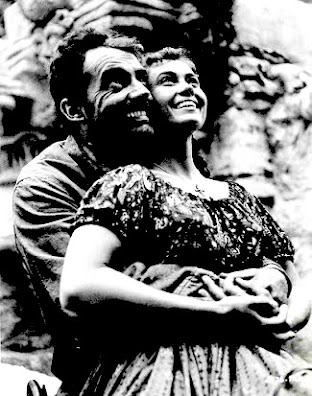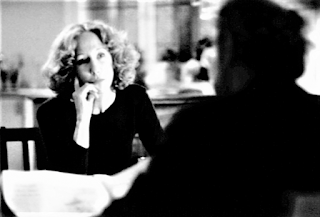On February 1st, 2020 a new Anne-Marie Miéville Retrospective began at the Cinematheque Française in Paris. Jean-Luc Godard, who plays the role of 'Robert' in the maiden film of the retrospective, AFTER THE RECONCILIATION (Après la réconciliation, 1999), planned to attend the first projection but canceled. In his stead (N.B. not their stead) he sent a four-page letter to be read aloud to the audience. The letter was enclosed in a small red notebook with a black ribbon tie and included a note on the cover to the lecturer (the C.F.'s Frédéric Bonnaud) that read "Please, respect the commas in your diction", and an image pasted in the center of a naked child embracing a frog. This cameo of a frog gifted the translator a dilemma, or a bit of langage; the smile mentioned in the letter as "de grenouille" ['of a frog'] can be translated as "piggy bank" but must also be understood, and embraced, as a "frog's smile". That of Anne Baxter's. Read on...
(photos grâce à 槻舘南菜子 — A.R.)




All these women, said Ingmar, not Stenmark, Bergman. At random, Anne Baxter, at the end of the "Ambersons", even if without Orson Welles and massacred by RKO, Anne Baxter, with her mechanical piggy bank smile, delivering the code of reconciliation: moula ha ha! but we'll know nothing more, the classical cinema, just like the modern one, stops here, dreams of a road to reconciliation, but never further.
Another example, again at random, believe me: in the naked dawn, celebrated in the Cahiers by Truffaut, when Arthur Kennedy sacrifices himself and lets his Mexican love fly away, we'll know nothing more, no more, of what to do after all those happy endings cherished by the big and small studios of the world.
And the same in one of my films, shot however in Sarajevo, which ends with these words: it was quite beautiful and clear, we could see very far, but not as far as Olga had gone, and again, despite the desire to go deeper than Pierrot's madness, once again, or to put it better, more anciently, after a feeling of reconciliation with the universe, the sea and the sun, world cinema stands still, in space and time.
Here too, see too, randomly from memory, the famous lieutenant Devigny, finally reconciled with freedom, but to what end? vociferates Bernanos, in this Europe humiliated like a child, and corrupted by a reconquered freedom. Hey-las! not a question for cinema's best (a game you might say, of dvd, a few words in a month from now) to perch on those condemned to live, like poor Edmée Deletraz.
And so now, this girl of the 14th of July who is going towards life, this Charlotte without Veronique, rather this red Charlot, even if Kiarostami drives her beyond the middle hills, will not come back down to the difficulties of the plains.
Well, let's stop the lists, the game you all know, you're going to quote me on ten thousand exceptions, but I fear that only your langue will speak, without the participation of langage, or too little, and too slyly. And if most films are resigned to a happy retirement, only one did not accept the edict, the one that you are about to see and hear, because it's located in a place where nobody, for lack of courage or weariness (metaphysics and morals disappeared from the baccalaureate, jumped ship), nobody put themselves on the assembly line so dear to Robert Linhart, even bourgeois: after, not before: after the reconciliation, never before, never again, but afterwards, and it's not going to be easy, declared the inimitable Nicole Stéphane. Go forth, my friends, sweet projection !
and it's not going to be easy declared the inimitable Nicole Stéphane. Go forth, my friends, sweet projection! In fact, as the former director of the American Federal Reserve said: if you've understood me, it is, without a doubt, because this game of mine was poorly expressed.




*
All these women, said Ingmar, not Stenmark, Bergman. At random, Anne Baxter, at the end of the "Ambersons", even if without Orson Welles and massacred by RKO, Anne Baxter, with her mechanical piggy bank smile, delivering the code of reconciliation: moula ha ha! but we'll know nothing more, the classical cinema, just like the modern one, stops here, dreams of a road to reconciliation, but never further.
Another example, again at random, believe me: in the naked dawn, celebrated in the Cahiers by Truffaut, when Arthur Kennedy sacrifices himself and lets his Mexican love fly away, we'll know nothing more, no more, of what to do after all those happy endings cherished by the big and small studios of the world.
And the same in one of my films, shot however in Sarajevo, which ends with these words: it was quite beautiful and clear, we could see very far, but not as far as Olga had gone, and again, despite the desire to go deeper than Pierrot's madness, once again, or to put it better, more anciently, after a feeling of reconciliation with the universe, the sea and the sun, world cinema stands still, in space and time.
Here too, see too, randomly from memory, the famous lieutenant Devigny, finally reconciled with freedom, but to what end? vociferates Bernanos, in this Europe humiliated like a child, and corrupted by a reconquered freedom. Hey-las! not a question for cinema's best (a game you might say, of dvd, a few words in a month from now) to perch on those condemned to live, like poor Edmée Deletraz.
And so now, this girl of the 14th of July who is going towards life, this Charlotte without Veronique, rather this red Charlot, even if Kiarostami drives her beyond the middle hills, will not come back down to the difficulties of the plains.
Well, let's stop the lists, the game you all know, you're going to quote me on ten thousand exceptions, but I fear that only your langue will speak, without the participation of langage, or too little, and too slyly. And if most films are resigned to a happy retirement, only one did not accept the edict, the one that you are about to see and hear, because it's located in a place where nobody, for lack of courage or weariness (metaphysics and morals disappeared from the baccalaureate, jumped ship), nobody put themselves on the assembly line so dear to Robert Linhart, even bourgeois: after, not before: after the reconciliation, never before, never again, but afterwards, and it's not going to be easy, declared the inimitable Nicole Stéphane. Go forth, my friends, sweet projection !
JLG
and it's not going to be easy declared the inimitable Nicole Stéphane. Go forth, my friends, sweet projection! In fact, as the former director of the American Federal Reserve said: if you've understood me, it is, without a doubt, because this game of mine was poorly expressed.
JLG
N.B.—
*

























1 comment:
Few noticed, but this is a new piece of film criticism by Godard. Lyrical, analytical, and undiminished in his way, it expands on the uniqueness of Miéville's film in the history of cinema--something he'd mentioned by mouth in a recent interview--, that is, it may be the only film, the only, that deigns to see what happens after a reconciliation of people -- not leading up to, and ending upon a reconciliation -- but commencing after the reconciliation.
Post a Comment